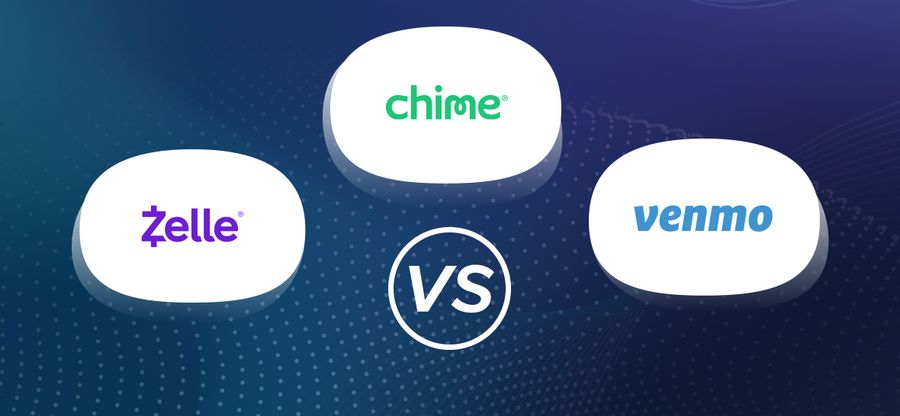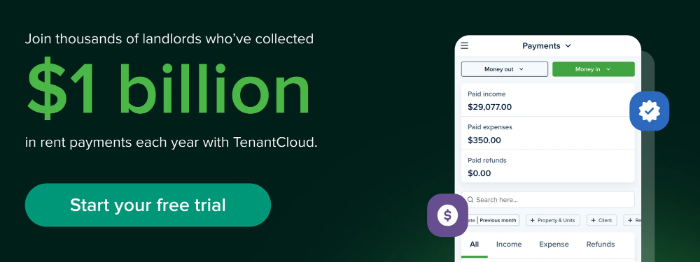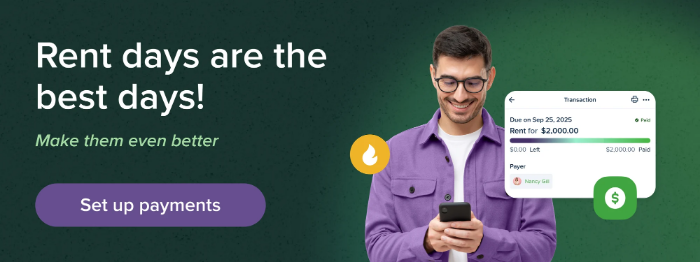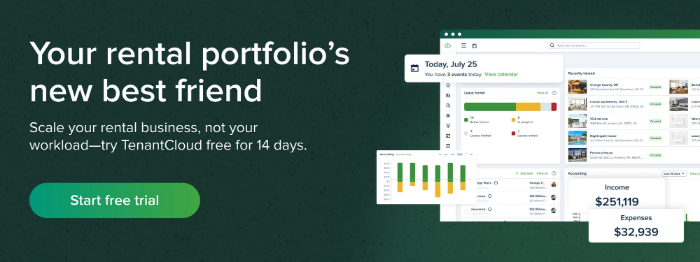When it comes to managing rent and property payments, the sheer number of options can make your head spin. What used to be a simple choice between cash, check, or direct deposit is now split across an untold number of payment options.
Landlords and property managers want payments completed on time. Meanwhile, tenants are increasingly expecting convenient digital payment options that fit their budgets and lifestyle.
Payment apps – Cash App, Venmo, Zelle, and Chime – each claim to be the best online payment options for 2025 and beyond. But which are actually serious about safe and secure payment processing?
As a property owner or manager, you need more than just a way to send money between friends. You want to know that you’re working with reliable bank account integration, professional-level security, and reasonable fees for larger transactions.
Some payment apps are great for casual peer-to-peer transfers but aren’t quite built for handling large monthly rent payments of $1,500 or more.
So, are payment apps the future of rent and property payments? What’s the difference between each option? Read on to learn a bit more about Zell vs Chime vs Venmo, and how you can pick the best acceptable payment options for your properties.
What Is a Payment App?
You may not be familiar with all the popular digital payment apps, but you’ve likely used a few. Venmo and Cash App are two of the most popular digital payment options on the market, designed to allow anyone with a debit card to easily send money digitally.
Most payment apps work on a simple concept: connect your bank account or card to an account on the app, and send money with a single click to any other user. These apps have been great for splitting bills, paying friends and family for small purchases, and other fast-cash needs (when physical cash is scarce).
As these apps become more popular, many are using them for larger and larger payments. Rent, mortgages, car payments – any payment that can be done digitally now has the potential to be sent via a digital payment app.
But with ease of convenience comes potential risks. Do you know that the app you’re using is safe? How fast is money moving between accounts? Do you know who is on the other end of a payment?
Most popular payment apps are built with strict security compliance as well as regulations to keep users safe, but when you take out the step of physically paying or receiving cash, it's important to be aware of any potential risks for your property finances.
Payment Apps Comparison: Zelle vs Chime vs Venmo vs Cash App
While there are many digital payment platforms out there (we won’t even mention the rise of cryptocurrency!, there are four major platforms that dominate the market. Let’s take a look at each one.
Zelle
Zelle looks like a digital payment app, but it really operates more as a bank-integrated network rather than a standalone app.
Zelle has been built directly into the mobile banking apps of over 2,200 participating banks and credit unions. Top adopters of Zelle include major banks like Bank of America, Chase, and Wells Fargo. When users send money through Zelle, the funds will move directly between bank accounts without fees – with most payments arriving in minutes.
For property managers, this fast movement of funds could mean faster rent collection without added fees. However, Zell is limited by the requirement of both parties having bank accounts at participating institutions. This means your use of Zelle may be limited to those renters who have banks that have Zelle access – so you’ll likely need multiple payment options.
Chime
While Zelle operates as a money-moving system, Chime operates as a digital banking platform in itself. That means Chime actually offers distinct checking account and savings account services through partner banks (including The Bancorp Bank and Stride Bank).
Chime accounts are FDIC-insured and have features like early direct deposits, no monthly fees, and a Cash Card debit card that account holders can use to pay for purchases.
Chime offers a "Pay Anyone" feature for peer-to-peer payments, but it's not as widely adopted as other platforms. The real value for property professionals is Chime's banking services. Owners and landlords can offer Chime as an option for renters who may need banking services, which can help increase the adoption among your properties.
Venmo
If you’ve paid anyone digitally, you’ve likely used Venmo. As one of the most popular payment apps on the market today, Venmo operates as a standalone “digital wallet” managed by PayPal.
Venmo was designed primarily for social payments between friends and family. Venmo account holders can accept money or deposit money into their Venmo balance, and then use that money for purchases. Users can also instantly send money from their balance or their connected cards to individuals and businesses.
Venmo also has a public and private element – with users showing short descriptions of what they’ve sent or accepted money for in a social feed on the app.
Does Venmo work for property payments? Like other payment apps, it depends. Venmo does offer business profiles that property managers and landlords can create to accept payments directly. These business accounts do come with additional protections and features, which could make them enticing for owners. However, the social nature and some larger transaction limits can make it less than ideal for professional rent collection.
Cash App
Second to Venmo, Cash App is one of the most popular digital payment apps on the market. Developed by Block (formerly Square), Cash App combines the peer-to-peer payments experience with other financial features, such as investments and a Cash Card debit card program.
Like other payment apps, Cash App users can send money, invest in stocks and Bitcoin, and access their Cash App balance through direct deposit and ATM networks.
When compared to other payment apps, you’ll find that Cash App has become more popular for business transactions. Its integration with Square’s business ecosystem gives you plenty of other tools to use as well – great for property managers or landlords who have other businesses they manage.
However, Cash App is limited by its user base and integrations, so you’ll want to make sure you have the right options available for renters depending on your use case.
How Do Payment Apps Connect to Your Bank Account?
Your rent collection depends on a fast and easy integration between digital payment platforms and traditional banking systems.
While each payment app promises fast and easy transactions, they still operate as a middleman in the process – so knowing how each one connects with bank accounts and other financial institutions is important.
Zelle: Direct Bank Integration
Zelle is fairly straightforward, connecting directly with bank accounts through the user’s existing banking app.
If you bank with a Zelle institution, access to the app comes automatically. This means you can expect a bit faster movement of funds without potential intermediate holding periods.
This means that tenants using Zelle can potentially send their rent payments directly to your bank account, and you’ll see the funds appear immediately. But access to Zelle isn’t universal, so you’ll need to plan for alternatives.
Chime: Banking Features Built In
Unlike a connection between banks, Chime provides the bank account itself. So, when a tenant uses Chime, they’re sending money from an account tied to The Bancorp Bank or Stride Bank through Chime's platform.
For property managers, this could be beneficial, as Chime’s functionality means that renters are sending money from a legitimate (and traceable) checking account with routing and account numbers, not just a payment app balance.
Tenants using Chime accounts can set up traditional ACH payments for transfers, direct deposits, and other banking services, which can be great for automating rent payments.
Venmo: Multi-Source Flexibility
Venmo is a bit of an octopus in the payment world, with tentacles in all kinds of funding sources. Users can connect bank accounts, debit cards, credit cards, and even cryptocurrency accounts. They can also maintain a Venmo balance funded from various sources and send money directly from that balance or connected accounts.
This flexibility appeals to tenants who prefer options, but creates complexity for property managers. Payments might come from different funding sources with varying processing times.
Credit card payments incur a 3% fee that tenants may attempt to pass along, while bank account transfers take 1-3 business days, unless the tenant pays for instant transfers.
Cash App: Balanced Approach
Cash App strikes a middle ground in the digital payment app market. Cash App offers users both the wallet functionality of Venmo and the more direct bank account integration of others on this list.
One thing that sets Cash App apart is its focus on business accounts – which can be attractive for those collecting property management fees. The business accounts offer Cash App higher transaction limits for verified businesses, and its internal categorization can be great for expense tracking.
Other Key Features for Payment Apps Compared
Payment Methods & Card Support
You’ll find that different tenants will prefer a variety of payment methods, even when using similar payment apps. Knowing what types of payment methods and card support each app offers can help you pick which to accept.
Feature | Zelle | Chime | Venmo | Cash App |
Funding Sources | Bank accounts only | Chime account + external banks | Bank accounts, debit cards, credit cards, Venmo balance | Bank accounts, debit cards, credit cards, Cash App balance |
Debit Card Offered | No | Yes (Chime Cash Card) | Yes (Venmo debit card) | Yes (Cash Card with Boosts) |
Credit Card Payments | Not supported | Not applicable | Supported (3% fee) | Supported (3% fee) |
Prepaid Card Support | No | No | Limited | Limited |
FDIC Insurance | Through your bank | Yes (partner banks) | Linked accounts only | Cash App Savings only |
Transfer Speed & Limits
When collecting rent, speed matters. You’ll find that faster transfers improve your cash flow, and having higher limits means you can collect rent from luxury properties without hitting transaction caps that might delay payments.
Feature | Zelle | Chime | Venmo | Cash App |
Standard Transfer Speed | Instant (minutes) | 1-3 business days (external) | 1-3 business days | 1-3 business days |
Instant Transfer Speed | N/A (always instant) | Instant (Chime to Chime) | 30 minutes | Within minutes |
Instant Transfer Fee | Free | Free (Chime to Chime) | 1.75% (max $25) | 0.5% - 1.75% |
Daily Limits | $2,500 - $5,000* | Varies by account type | Up to $4,999.99 | $7,500/week (verified) |
Business Account Limits | Higher (bank dependent) | Standard limits | Higher for business profiles | Enhanced for business |
Fees & Costs
Transaction fees can add up quickly when you’re collecting payments from multiple units. Some payment apps aren’t designed for big transactions, and the costs can eat into your profit margins.
Feature | Zelle | Chime | Venmo | Cash App |
Standard Transfers | Free | Free | Free | Free |
Credit Card Payments | N/A | N/A | 3% fee | 3% fee |
Monthly Account Fees | None (through bank) | $0 | $0 | $0 |
ATM Fees | N/A | Free (50,000+ locations) | $2.50 (out-of-network) | Varies by ATM |
Business Transaction Fees | Free | Not applicable | 1.9% + $0.10 | 2.75% per transaction |
Security & Protection
Another key consideration is payment security. Accepting and moving a larger online rent payment means you need secure channels. You may be risking both your own and your tenants’ financial data if you use a payment option that lacks built-in security.
Feature | Zelle | Chime | Venmo | Cash App |
Encryption | Bank-level | Yes | Yes | Yes |
Fraud Monitoring | Through bank | Yes | Yes | Yes |
Purchase Protection | No | Standard Visa protections | Business transactions only | Limited |
Dispute Resolution | Through bank | Limited | Standard process | Standard process |
Two-Factor Authentication | Bank dependent | Yes | Yes | Yes |
Other Payment App Features That Matter For Landlords
International Payments and Cross-Border Capabilities
Zelle, Chime, and Venmo operate exclusively within the United States, which may limit the ability to accept international transactions. This may be a limitation if you are not in the US or handle payments from international students or similar individuals who may need to send money abroad.
Cash App has limited international availability in the US and UK, but doesn't support transfers between countries. You may need to keep traditional wire transfers available, depending on your tenants.
Money Transfers
Money transfers through payment apps vary significantly in speed, cost, and reliability. Smaller amounts may move quickly, while larger ones – such as rent payments – may require multiple money transfers to stay within daily limits. This can complicate the process for larger transfers.
Online Payments and E-commerce Integration
Are you thinking about integrating your payment collection with your website or property management software?
While Zelle operates primarily through bank apps, Cash App's Square integration can help speed up payments on a digital level. Similarly, Venmo and Cash App both support online payments through merchant partnerships, so tenants can pay faster (with potential fees.)
Instant Transfers vs. Standard Processing
When it comes to rental payments, speed and processing matter more than you might expect. You’ll find that different apps approach transfers and processing speed differently, depending on the setup and integrations.
For example, Zelle provides instant transfers at no cost between participating banks, while other apps may charge fees for instant transfers (typically 1.5-1.75%). Some offer free standard transfers that take 1-3 business days.
Checking Account Requirements and Integration
You’ll find that checking account requirements vary depending on which app you use. Zelle requires both parties to have accounts at participating banks, while Chime provides its own checking account services.
Choosing the Right Platform for Your Checking Account and Payment Needs
Choosing which payment apps to accept for your properties requires more than just knowing how the app works. You’ll find that each one has benefits that vary depending on your specific situation.
For instance, are you a small-scale owner who is managing a few properties? Then you may find a simple app more useful than creating business accounts or opening new checking accounts for a single app.
But if you are scaling your operations and want to attract more tenants, you’ll find that widening the types of payment options can boost satisfaction (and help rent payments arrive on time!)
Why TenantCloud Online Payments are a Better Option
Platforms like Venmo, Zelle, Chime, and Cash App may let money fly between phones, but they leave landlords hanging when it comes to the unique needs of a rental business. TenantCloud, by contrast, was engineered for landlords from the ground up. Rent collection, payment tracking, and financial organization all live in the same, snap-easy dashboard.
Your tenants can zap rent from anywhere, and you can sit back and let billing, chargeback defense, and fraud shields do the heavy lifting. Each payment lands in the right ledger, too, so profit-and-loss statements and tax-ready reports run themselves.
Advantages of Using TenantCloud for Online Payments
- Recurring Rent Collection – Schedule automatic reminders and have rent deposit straight to your account, on time, every time.
- Transparent Payment Tracking – Keep a clear view of each tenant’s payment clock and history.
- Comprehensive Management Suite – TenantCloud doesn’t stop at payments; run tenant screening, maintenance requests, and more, all from a single hub.
- Dedicated Support – Our friendly, expert team is a call or chat away, ready to tackle your questions.
- Military-Grade Security – Your data and money are shielded by top-tier encryption and strict regulatory protections.
Ready to Optimize Your Property Management Payments with Digital Apps
Property managers have plenty of options when it comes to accepting rent and other payments. The issue isn’t so much which option to offer, but knowing how each operates and the benefits that each can bring to everyone involved.
Zelle's instant, fee-free bank transfers are great for smaller, cost-conscious operations, while Chime's comprehensive banking services are suitable for new tenants who are unfamiliar with banking. Apps like Venmo and Cash App offer plenty of flexibility and social features that may appeal to younger tenants.
Which is best for your property payments? That depends on your setup and goals, as well as how familiar you are with digital payments.
Many property managers will adopt a flexible approach – accepting multiple payment methods while establishing clear policies about fees and expectations on when payments should be made.
Offering traditional and digital payment options can help open up more opportunities for tenants (and help keep your properties full and your rental payments moving!)
The Future of Payments is Here – Are You Equipped to Manage It?
Modern rent payment habits continue moving toward digital solutions, so are you ready to respond?
The best owners and landlords know that adapting to changes is necessary to serve the next generation of tenants, and taking the time today to learn more about each payment option can help set you up for success.
Want to upgrade your rent collection process? TenantCloud's comprehensive property management platform integrates with multiple payment methods, helping you collect rent efficiently while minimizing fees and administrative overhead.
No matter how many properties you manage or your needs, TenantCloud has a solution for you. Learn more online today and find out other ways to enhance your property management for the digital age.








